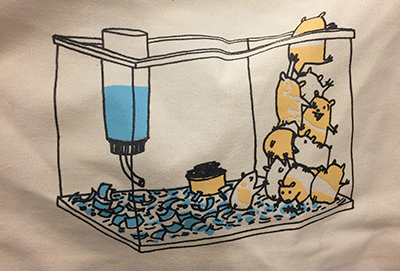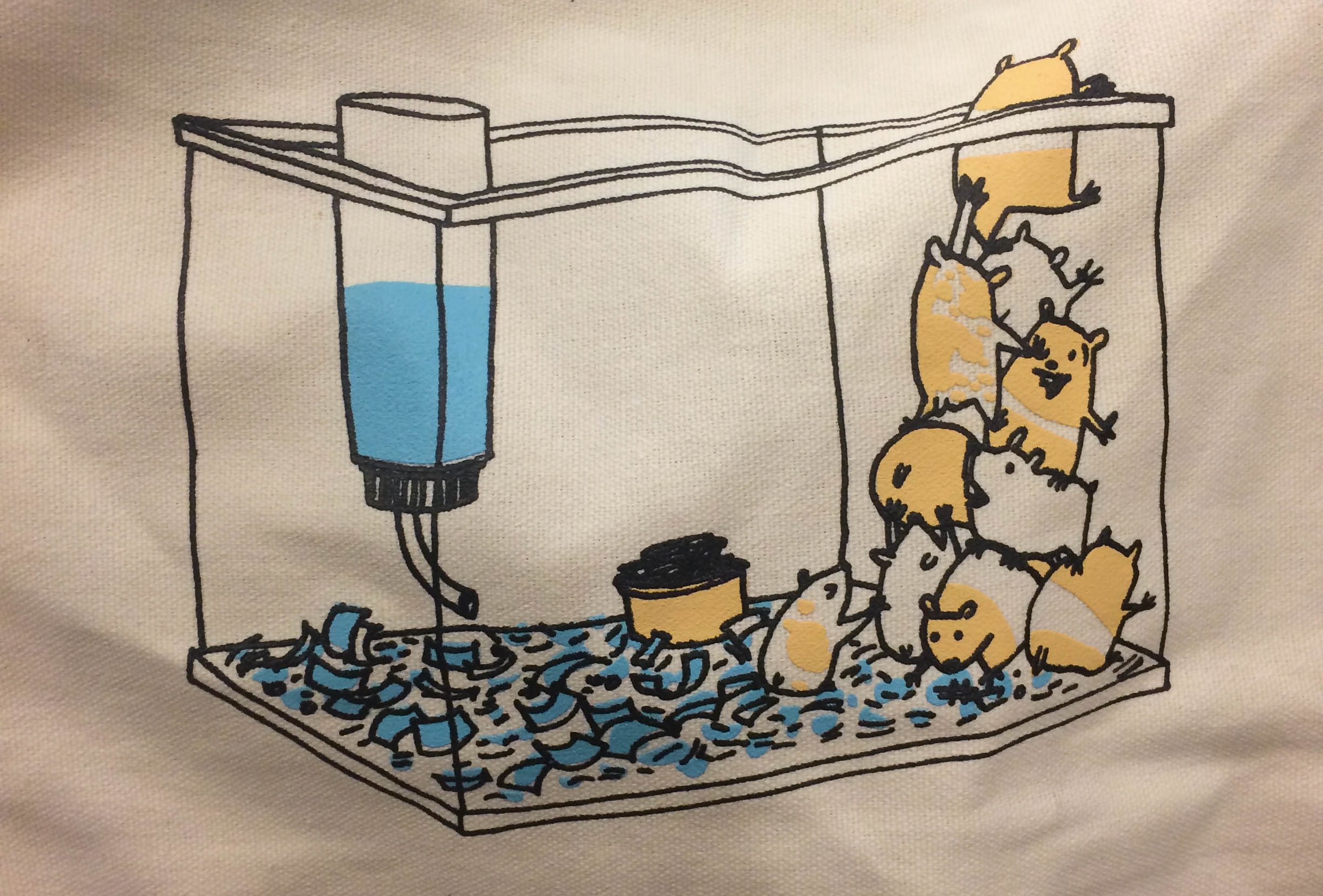By Jennifer Grayburn
This post originally appeared on the CLIR Re: Thinking blog.
Ten hamsters pile on top of each other. As one hamster on the third row of this unusual pyramid smiles out at us, another boosts the topmost hamster up. It starts to peek up and out of their cage…

This whimsical image appeared on each of the bags piled behind the registration desk of The Collective, a conference held March 2-3, 2017 in Knoxville, TN. A little absurd and absolutely unexpected, the hamsters were the sole feature on the conference swag-bag and instantly set the tone of the conference. This initial impression suggested that The Collective would not offer a typical conference experience and was quickly confirmed— when I sat at a table topped with crayons and paper ready for the keynote activity.
According to their website, The Collective is “geared towards librarians, archivists, and library staff at academic libraries…and brings together next-generation practitioners who wish to learn from and collaborate with one another.” This message resonates deeply with my own experience as a CLIR postdoctoral fellow and embraces the interdisciplinary, collaborative, and technologically proactive problem-solving necessary for libraries in the 21st century. Still, I am not sure I was prepared for the overwhelming sense of community and support, both informal and professional, the conference projected. To help achieve their mission, the conference organizers announced three goals: make it affordable, make it useful, make it fun. Indeed, the sum of these three parts fostered a collaborative environment embracing the perspectives not only of a wide range of library staff, but also of their institutional stakeholders.
The first point, make it affordable, was fairly straightforward—though with surprising results. Without a doubt, the $80 registration fee was nominal compared to other conferences, and yet there was no loss in the quality of sessions, activities, or amenities. Entirely non-profit and volunteer run, the registration did not even cover the total cost of food. Rather, fundraising and new sponsor partnerships (fostering “real discussion rather than sales pitches”) kept costs low so more people from diverse institutional backgrounds could participate. While I often skip isolated vendor areas at other conferences, the inclusion of vendors as attendees in the conference sessions and at the social events ensured varied, inclusive discussions. At the dinner and reception, for example, I discovered that I was sitting with the representatives of two academic publishers. There were no sales pitches or exchange of marketing material. Rather, our conversation migrated from the sessions we attended to the role of open access from publisher and library perspectives. While vendors like these help to keep costs down, within this context, they also provided unexpected insight into faculty-press-library relationships I never had the opportunity to consider. As we continue to tackle problems of rising publication costs, open access movements, and preservation, it seems all the more pertinent that all stakeholders of all levels are represented in these conversations.
In terms of being useful, the schedule included something for everyone: diverse social activities, hands-on workshops, interactive panels, group discussions, and pop-up activities to encourage skill development and an exchange of ideas not only between presenters and attendees, but also among attendees themselves. The Maker Talk panel I was on, for example, was guided by the results of a survey sent out a few weeks earlier and developed organically into a discussion about library makerspace resources and services. The aim of the session was to provide practical models and solutions for those interested in setting up a makerspace in their library; yet, an additional effect was a dialogue across institutions hinting at best practices and the establishment of a new professional community/listserv. Still, in addition to this collaborative networking, I gained practical experience with tools relevant to new-generation library concerns: github/Jekyll, Trello workflows, Digital Humanities project support, and littleBits electronic components. Each session was interactive and encouraged conversation, with many presenters making their slides and materials available for us to bring back and share within our own institutions.
The third point, making it fun, was not as straightforward as I expected. True, the schedule included a number of engaging social opportunities: small pre- and post- workshops, informal “dine arounds” in Knoxville, and the (absolutely remarkable) dinner and reception at the Mill & Mine. Still, while enjoyable, I would not say that any one event generated “fun” in and of itself. Rather, I keep thinking of the swag-bag hamsters. As I sat at a table waiting for the keynote, I jokingly asked others at my table what they thought the hamsters signify. Without missing a beat, a librarian to my left suggested it is a representation of thinking outside the box. Yes! We laughed and pushed the interpretation further— to think outside the box, to meet the unknown future needs of libraries and patrons, we need to work together, to bolster each other up, to collaborate. This message could have been communicated in any number of ways; yet, like the wink of an inside joke, we realized the hamsters are us. This humor—encapsulated by the graphic, by the presence of a tech-free “shhh room,” by the play and discovery encouraged in the popup makerspace—was silly, but self-aware. And it only worked because the organizers, volunteers, and presenters so wholeheartedly embraced the mission of collaboration and the values of dialogue and professional support that they generated a shared sense of purpose and community that extended to all participants.
Libraries and universities are so easily segmented and siloed into different departments, and it is often too easy to get stuck in the cages of our own focused perspectives. This conference (and hopefully more like it) are starting to break down those cages to initiate the conversations necessary for a more collaborative professional culture.
